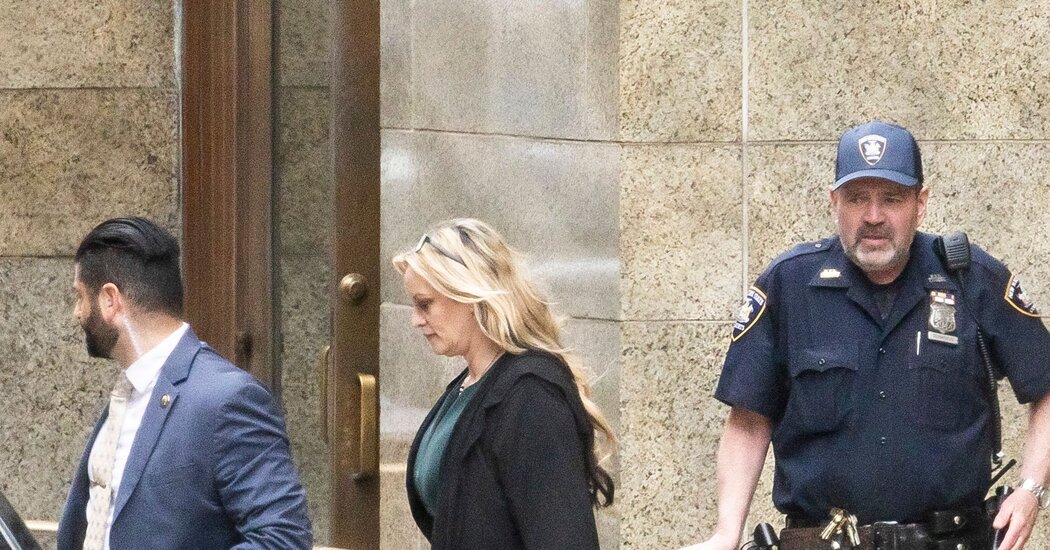Table of Contents
A tense day in court for Stormy Daniels
Lawyers for Donald Trump again sought to make Stormy Daniels look as if she was lying yesterday about her account of a 2006 sexual liaison. But Daniels — who took the $130,000 hush-money payment at the heart of the 34 felony charges Trump is facing — pushed back.
“You made all this up, right?” a lawyer asked.
Daniels responded with a forceful “No.”
During a combative cross-examination — which started on Tuesday and continued yesterday — Daniels swung between vulnerability and defiance. When the defense attacked her for hawking gear to supporters, she responded by likening it to Trump’s own merchandising.
Susan Necheles, Trump’s lawyer, searingly questioned Daniels for more than two hours. As Necheles tried to undermine her credibility, Daniels continuously parried. In one exchange, Necheles suggested that Daniels, because of her career in porn, had a lot of experience with “phony stories about sex.”
Daniels shot back, “The sex in the films is very real, just like what happened to me in that room.”
A Daniels-Trump recap: They met in July 2006, but their lives intersected over the next decade and beyond. Here’s a breakdown of the timeline.
Hopes for a Gaza deal shrank as talks stalled
High-level negotiations in Cairo were put on hold yesterday; the Israeli and Hamas delegations left, as did the C.I.A. director, dealing a blow to hopes a deal could be reached soon.
The pause is a setback, given that some had seen signs earlier in the week that a deal might be close. Still, one official said that negotiators were interpreting the suspension as a pause rather than a derailment.
Israel’s actions in Rafah could set the tone for future discussions. On Wednesday, President Biden acknowledged that Israel had used American bombs to kill civilians in Gaza. He said the U.S. would also withhold artillery if Israel were to go ahead with a major operation in Rafah.
Prime Minister Benjamin Netanyahu of Israel reacted defiantly to Biden’s comments: “If we need to stand alone, we will stand alone.” Fears are growing that a rift with the U.S. could affect Israel’s ability to continue its war. Netanyahu is caught between allies demanding a cease-fire deal and right-wing demands in his own country to go forward with the invasion.
A view from the sky: These satellite images of Rafah, taken after Israeli forces entered the city, show widespread damage and clusters of Israeli armored vehicles.
Ukraine strikes deep in Russia
Ukraine struck an oil refinery far inside Russia, officials on both sides said yesterday, as Kyiv works to weaken Russia’s military and its energy industry.
The drone strike on the facility, which is one of Russia’s largest and lies more than 700 miles (over 1,100 kilometers) from Ukraine’s border, shows that Kyiv is increasingly able to reach targets further inside its enemy’s territory.
Background: This attack, along with others on two oil depots, were part of an ongoing campaign. Kyiv hopes to disrupt Russia’s military logistics by targeting the facilities that supply fuel for its tanks, ships and planes. Ukraine also hopes to undermine Russia’s energy industry, which is central to its economy.
Impact: An energy expert in Belgium said the strikes had taken more than 10 percent of Russia’s oil-refining capacity off line, temporarily reducing its ability to turn its crude oil into products like gasoline, diesel and petrol.
MORE TOP NEWS
Majid Khan, a former courier for Al Qaeda, spent two decades in Guantánamo Bay and was tortured in C.I.A. custody. In the year since his release, he has reunited with his wife, met his daughter and had a son. They now live in Belize.
“Life is a test,” he said. He sees the next chapter of his life as an opportunity to make things right. He was hurt, he said, and did things that hurt others. “May God forgive.”
For more, listen to the latest season of the “Serial” podcast, which is about Guantánamo.
Lives lived: Steve Albini, a musician and audio engineer who helped define the sound of ’90s alternative rock, died at 61. Listen to some of his essential recordings.
CONVERSATION STARTERS
-
New friends: Our tech columnist spent the past month hanging out with some A.I. companions. This is what he learned.
-
More drugs, less violence: Changing attitudes have prompted Britain’s film ratings board to rerate some classic movies, like “Mary Poppins.”
How loneliness affects the brain
Everyone feels lonely from time to time. But for some people, loneliness becomes entrenched in a way that’s bad for their health. Chronic loneliness can even change people’s brains.
Neurologically, chronic loneliness is associated with changes in areas important for social cognition, self-awareness and processing emotions. For years, scientists have known about a connection between loneliness and Alzheimer’s disease and other types of dementia. A study published late last year suggested an association with Parkinson’s disease. It is also linked to depression.
So what can you do? It sounds obvious, but a common recommendation is to put yourself in places and situations where you can meet people and make new friends. Cognitive behavior therapy can also help address the root problem for why it might be hard for you to interact with others.


